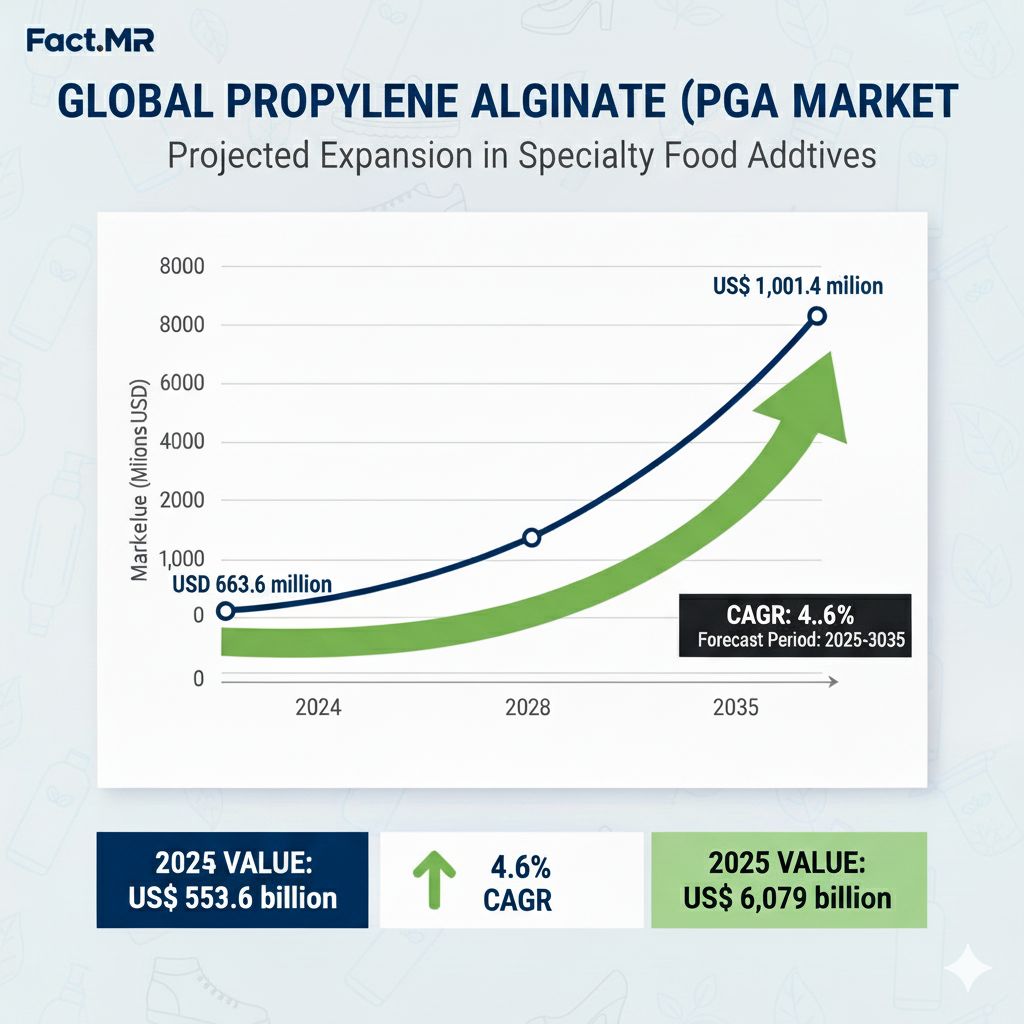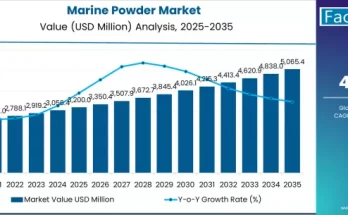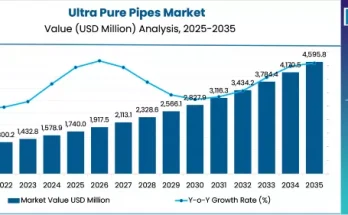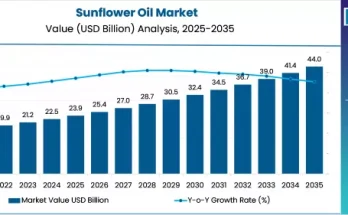The global propylene glycol alginate (PGA) market is estimated to be valued at USD 663.6 million in 2025 and will expand at a noteworthy CAGR of 4.6% to end up at USD 1,001.4 million by 2035.Propylene glycol alginate, a multifunctional derivative of alginic acid extracted from seaweed, is increasingly gaining prominence across the food, pharmaceutical, and cosmetic industries. Its ability to act as a stabilizer, thickener, emulsifier, and gelling agent makes it indispensable in today’s global clean-label and natural ingredient movement.
Rising Demand for Clean-Label and Natural Ingredients Fuels Market Growth:
The growing consumer shift toward organic, plant-based, and health-conscious products has significantly amplified the role of PGA in modern formulations. Clean-label food manufacturers, beverage producers, and pharmaceutical firms are increasingly adopting PGA due to its natural origin, biocompatibility, and functional versatility.
From ready-to-eat meals and functional beverages to vegan-friendly cosmetics and drug formulations, the appeal of PGA lies in its ability to deliver superior texture, stability, and shelf-life without synthetic additives. The Asia-Pacific and North American regions are expected to lead this transformation, accounting for the largest market shares over the coming decade.
“Propylene glycol alginate aligns perfectly with the global transition toward sustainability and health-oriented formulations,” said a Fact.MR spokesperson. “Its natural seaweed-derived composition and multifunctional properties make it a cornerstone ingredient in next-generation consumer products.”
Food and Beverage Sector Dominates the Market:
The food and beverage industry represents the largest segment of PGA application, accounting for over 60% of global market value in 2024. As global consumption of processed, convenience, and plant-based foods accelerates, manufacturers are turning to PGA to achieve desired viscosity, stability, and sensory characteristics.
In India, the surge in functional and performance beverage consumption—including protein drinks, smoothies, and energy beverages—has notably boosted PGA demand. The compound’s stabilizing and foaming properties make it ideal for use in non-alcoholic beer, dairy alternatives, sauces, and dressings.
Rapid urbanization and lifestyle changes in emerging markets are also catalyzing consumption, with consumers seeking healthy, shelf-stable, and transparent-label products. This trend ensures sustained demand for PGA across the food and beverage manufacturing landscape.
Pharmaceutical and Personal Care Industries Embrace PGA Innovation:
Beyond the food industry, pharmaceutical manufacturers are leveraging PGA for its role in stabilizing drug suspensions and emulsions, improving drug uniformity and shelf stability. PGA helps prevent the sedimentation of colloids, ensuring consistency in liquid formulations — a critical requirement in pediatric and geriatric medicine.
The cosmetics and personal care sectors are also witnessing an upsurge in PGA applications, particularly in haircare, skincare, and beauty formulations, where it enhances product consistency and sensory appeal. The growing focus on natural and biodegradable ingredients within these sectors aligns perfectly with the adoption of seaweed-derived compounds like PGA.
Regional Growth Insights: China, India, and France Lead the Surge:
– China is emerging as a powerhouse for PGA consumption, with a forecasted CAGR of 6.5% (2025–2035). As a major global food exporter, China’s compliance with international safety and quality standards is driving the use of PGA in food and beverage exports.
– India, growing at 5.9% CAGR, benefits from a booming functional beverage market, rapid urbanization, and expanding food processing infrastructure supported by government initiatives.
– France shows steady demand growth, fueled by the rise of functional foods, dairy alternatives, and sustainable product development supported by R&D in alginate-based solutions.
Challenges and Regulatory Landscape:
While the market outlook remains optimistic, PGA manufacturers face challenges related to stringent regulatory compliance across regions. Authorities such as the U.S. FDA, European Food Safety Authority (EFSA), and China’s NMPA enforce strict standards regarding product purity, labeling, and approved concentration levels.
These requirements increase production costs and extend approval timelines. Industry leaders are responding with increased R&D investments, advanced testing capabilities, and collaboration with regulatory bodies to accelerate market readiness while maintaining transparency and safety standards.
Key Market Players and Competitive Developments:
The propylene glycol alginate industry features a competitive and innovation-driven landscape led by global companies such as:
- Kikkoman Corporation
- KIMICA Corporation
- Rizhao Jiejing Group Co., Ltd.
- Fuji Kasei Co., Ltd.
- Qingdao Megatro Holding Inc.
- Aspartic Space Inc.
- Universal Preserveachem Inc.
Notably, Kikkoman Corporation announced a USD 560 million investment in a state-of-the-art production facility in Jefferson, Wisconsin, set to begin operations in 2026. This plant will produce soy sauce and PGA-related seasonings, marking a strategic expansion of its U.S. footprint.
Meanwhile, KIMICA Corporation achieved Japan’s prestigious 5-star BELS certification for sustainability in 2023, demonstrating its commitment to energy efficiency and renewable integration — reducing environmental impact by over 50%.
Such advancements reflect the market’s transition toward sustainable manufacturing, quality enhancement, and innovation-led growth.
Future Outlook: The Road to 2035:
The propylene glycol alginate market’s trajectory is defined by innovation, sustainability, and cross-sector diversification. As advancements in biopolymer technology and green chemistry continue, PGA’s applications will expand beyond food and pharmaceuticals to encompass biodegradable packaging, nutraceuticals, and eco-friendly industrial formulations.
Fact.MR’s data-driven insights suggest that the next decade will see a broader integration of PGA in smart food systems, functional health applications, and bio-based industrial solutions, reinforcing its position as a pivotal ingredient in the sustainable materials economy.
Browse Full Report- https://www.factmr.com/report/propylene-glycol-alginate-market



